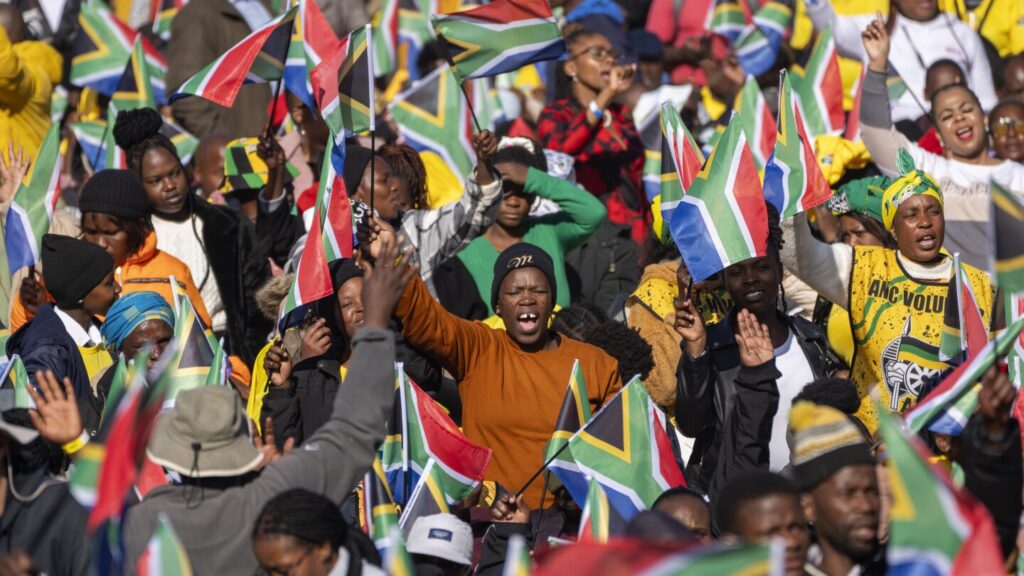Historic Coalition in South Africa: A Beacon of Unity or Revival of Racial Tensions?
CAPE TOWN, South Africa (AP) — In a nation where the scars of racial segregation run deep, South Africa’s new coalition government has presented an image of unity, symbolized by the coming together of President Cyril Ramaphosa, a Black leader from the African National Congress (ANC), and John Steenhuisen, a white leader from the Democratic Alliance (DA). This coalition, however, has inadvertently rekindled some of the country’s profound racial divides.
A week ago, the ANC, which liberated South Africa from apartheid in 1994 under the leadership of Nelson Mandela, entered into a power-sharing agreement with the DA, a significant political moment that has resurrected both hope and apprehension amongst South Africans. While this alliance promises a collective effort to address the nation’s deep-rooted socioeconomic problems, it has also triggered discomfort among many Black citizens, wary of a white-led party returning to a semblance of power—a potent reminder of their traumatic history under apartheid.
The racial dynamics of this coalition mirror the tumultuous era that followed South Africa’s first democratic elections in 1994. The apartheid regime, a draconian system of white minority rule that ended thirty years ago, left indelible marks on millions of Black South Africans. The economic disparities it created still loom large, with poverty and inequality remaining pervasive among the Black majority.
The recent electoral outcome on May 29, which ended the ANC’s three-decades-long political dominance, has led to an unexpected yet historic alliance. The DA, rooted in liberal white opposition to apartheid, seized the second-largest share of votes, necessitating a coalition for governance. Despite the symbolic gesture of unity between Ramaphosa and Steenhuisen, the sight of more white individuals in significant government roles stirs unease in a nation where whites constitute merely 7% of the 62 million-strong population.
The rhetoric of unity posed by this coalition was soon marred by controversy. The DA had to suspend one of its white lawmakers, Renaldo Gouws, over racist remarks made on social media a decade ago. Gouws, at the time a university student, used a term notoriously associated with apartheid-era hate speech. This incident, brought to light with Gouws already facing disciplinary action and the prospect of legal action from the South African Human Rights Commission, has reignited scrutiny of the DA, which has previously battled accusations of racial bias.
This is reminiscent of the historical challenges faced by the ANC, which in its fight against apartheid, allied with various groups in the name of national unity—a theme heavily underscored by Nelson Mandela during his presidency. The controversial statements by other political factions, like the MK Party led by former President Jacob Zuma, illustrate the ongoing racial tensions. Zuma’s faction recently branded Ramaphosa a "house negro" for his alliance with the DA and derided the DA’s white chairperson Helen Zille as Ramaphosa’s "slave master."
The narrative of race and privilege remains deeply embedded in South African politics. Statements from political leaders like EFF’s Julius Malema, who has a history of provocative remarks including, “We are not calling for the slaughtering of white people, at least for now,” underscore the persistent and pronounced racial and economic divides. According to a 2021 report by the South African Human Rights Commission, 64% of Black South Africans live in poverty compared to 1% of whites. This stark contrast fuels ongoing frustration and skepticism towards any political party perceived to neglect these entrenched inequities.
In response to the DA’s defensive posture, political analysts argue that the party has, at times, appeared disinterested in engaging with race-related concerns, thus perpetuating a sense of "whiteness" among its detractors. Angelo Fick, a seasoned political analyst, noted the DA’s need to address the persistent perception of racial insensitivity if it hopes to resonate more deeply with South Africa’s Black majority.
As President Cyril Ramaphosa acknowledged in his inauguration speech, the legacy of apartheid continues to manifest in today’s deeply polarized society. Echoing Mandela’s ethos, Ramaphosa reaffirmed the need for unity amidst these divisions, recognizing that socio-economic advancements for the Black majority are crucial.
The ANC’s Secretary-General, Fikile Mbalula, reiterated Mandela’s inclusive vision, stating, “To us, it doesn’t matter whether the cat is black or white,” in defense of the coalition with the DA. This signifies an effort to revive Mandela’s ideals in today’s governance landscape, focusing on national progress rather than historical animosities.
As South Africa navigates this intricate political terrain, the central question remains: Can this coalition truly move the country forward, or will it exacerbate the lingering racial and economic disparities?
For further updates on Africa, visit AP Africa News.
AP Africa contributed to this report.
